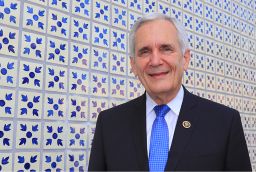Editor’s Note: Texas Democrat Lloyd Doggett represents the newly created 37th Congressional District. Robert Weissman is president of Public Citizen, a consumer rights advocacy group. The views expressed in this commentary are their own. Read more opinion at CNN.
Last summer, Congress passed overdue drug pricing reforms to help older adults afford their medications by empowering Medicare to negotiate some drug prices, limit drug corporation price spikes and cap out-of-pocket costs.


Though a step forward, it was not nearly enough to quell rising outrage over astronomical drug prices, and it did nothing for the more than 200 million Americans who are not on Medicare.
Negotiated prices will not take effect until 2026, and it will remain illegal for Medicare to negotiate the price of the vast majority of drugs. To provide immediate and expansive relief for all patients, not just those who rely on Medicare, President Joe Biden should use his existing authority to rein in pharmaceutical monopolies.
Prices for lifesaving treatments for everything from diabetes to cancer have been steadily rising in the United States, even as other countries pay a fraction for the medicines we do.
From July 2021 to July 2022, pharmaceutical companies increased prices by an average of 31.6% on more than 1,200 drugs — well above the rate of inflation, according to one report from the Department of Health and Human Services (HHS). And this month, drug makers are expected to raise prices on more than 350 drugs.
The President already has the authority he needs to bring down prescription drug prices, but so far, he hasn’t acted on requests from patients, advocates and members of Congress to take on monopoly pricing. He has hesitated to use the two key powers at the administration’s disposal to address the crisis of unaffordable medicines.
These tools include the government’s power to issue licenses waiving patents so generic competitors can enter the market early in exchange for reasonable compensation to the patent holder. The federal government used this law repeatedly in the 1960s to buy low-cost generic versions of patented drugs and still routinely uses this authority for other technologies, such as night vision goggles and electronic passports.
The second tool that the President could use is related to taxpayer-funded inventions. For drugs invented with taxpayer dollars, the government has the right to authorize generic competitors to use the patents to ensure the pharmaceuticals are “available to the public on reasonable terms.”
There’s nothing reasonable about today’s high drug prices. About 1 in 4 Americans taking prescriptions say it’s hard to afford their medications, a 2019 Kaiser Family Foundation Health Tracking Poll found, and a new study reveals that more than 1.3 million Americans with diabetes are delaying buying, skipping or rationing their insulin due to cost.
Unfortunately, the new federal law does not lower insulin prices and only caps monthly copays of insulin for Medicare beneficiaries, despite patients without insurance and with private insurance rationing insulin at higher rates. Further, copay caps without corresponding price reductions could lead to health insurance premium increases.
Even more outrageous, Americans pay more than two and a half times as much for prescription drugs than people in other countries do, according to a 2021 Rand Corp. report. For the 20 top-selling drugs, pharmaceutical corporations made more money in the US than in every other country in the world combined, according to a Public Citizen analysis. Other countries have meaningful price negotiation that not only lowers drug prices compared to what Americans pay, but also often incentivizes better innovation.
Last year, cancer survivors petitioned HHS to use its executive authority to reduce the cost of outrageously-priced prostate cancer treatment Xtandi, which is used to treat three common form of the cancer. In a recent letter to HHS Secretary Xavier Becerra, they noted that 33,000 men have died of prostate cancer since their petition has gone unanswered.
Xtandi was developed with US taxpayer funds, yet it costs about $190,000 a year for American patients, as much as six times higher than as in other large, wealthy countries, according to Knowledge Ecology International, a nonprofit that focuses on intellectual property in medicine. Advocacy groups and 100 members of Congress have urged HHS to grant a hearing on the Xtandi petition.
Even the threat of powerful action could lower prices, just as we saw in 2001 on the anti-anthrax drug Cipro. Then-HHS Secretary Tommy Thompson’s threat to authorize generic competition led to the price being cut in half. Action on Xtandi could force pharmaceutical executives to broadly rethink their practices.
To meet the needs of millions of Americans struggling to afford necessary medications, Biden must ensure the narrow legislative progress made last year is catalyzed into much broader relief through executive action.
Now is the time for the Biden administration to act to ensure that lifesaving medicines are affordable for all.


